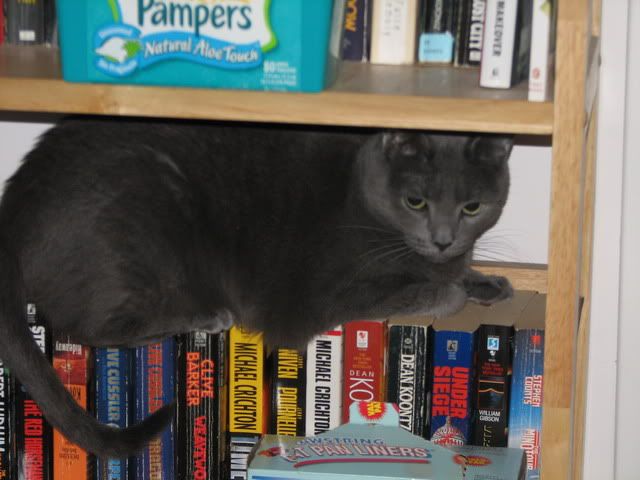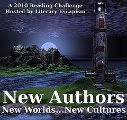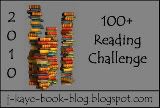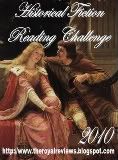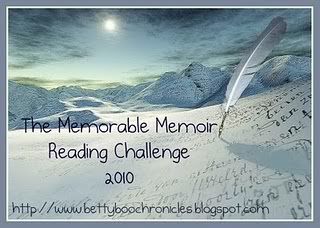I really enjoy books that are "different" and tell the story well. The Stolen Child by Keith Donohue is one of those books. It's the changeling story, a tale that is not new or different at all. Henry Day, a 7 year old boy, runs away from home one day and goes into the woods. He falls asleep and awakens to find himself being kidnapped by a troup of faeries that call him "Aniday". Meanwhile, another child--one who used to be a faery and has now molded his features to match Henry's exactly--goes "home" to take Henry's place.
Here is what I meant by the book being "different":
The new Henry and Aniday narrate the story in alternating chapters. Henry is angry, resentful and fearful of his old troup, calling them "hobgoblin" and "monsters". He is trying to learn how to be the boy who once lived in the house but there are differences that threaten to give him away and raise suspicions amongst family members. He is plagued with flashes of memory to the time he himself was taken by the faeries.
Through Aniday, we learn that there is a structure and a method to the madness of these faeries. There's a hierarchy about who leads and who gets to be the changeling next. They don't just choose any child. The child they decide upon has to be observed for a year and there are rituals to follow. At first Aniday misses his family but as he realizes he can never go back he becomes resigned and learns the ways of his troup. He makes good friends with one of them, Speck, and begins a rudimentary written account of his life with the faeries. Like the new Henry, he has flashes of memory and sometimes resentment against he who took his place.
The years go by. The new Henry grows up and the world changes. The environment is not especially friendly toward the faery troup anymore and they meet with several tragedies. Henry traces the memories of his first life back to Europe and actually finds his identity.
Inevitably, Henry and Aniday meet again. Henry now has a 7 year old son. He is tormented by his past life, his life in the woods and what he's done to Aniday. Does that make the son vulnerable to being kidnapped by what's left of the troup? Does Aniday have vengeance on his mind?
Read to find out! I was hooked right from the first page!
Monday, June 25, 2007
The Stolen Child
Posted by
Irishcoda
at
8:35 PM
1 comments
![]()
Labels: Books I've Read
Sunday, June 17, 2007
Dessert First
Somehow I forgot to do this one...
Booking Through Thursday
1. Do you cheat and peek ahead at the end of your books? Or do you resolutely read in sequence, as the author intended?
Unfortunately, I usually do cheat and read ahead. Usually it happens as I'm about to go to bed and cannot read any further. Usually I'm about half way through the book and I go take a peek at the end one night and what's coming up next on other nights. Maybe fatigue has something to do with this compulsion because I don't peek during
2. And, if you don’t peek, do you ever feel tempted?
Obviously yes
Posted by
Irishcoda
at
10:15 PM
2
comments
![]()
Labels: Booking Through Thursday
Summer Reads
I thought this summer I would go easy on the non-fiction and classics and try to get more of my Paper Back Swap books back out into circulation. After I finish reading The Stolen Child I plan to read:
Billy Straight by Jonathan Kellerman
Black Creek Crossing by John Saul
Brimstone by Douglas Preston & Lincoln Child
Constantine by John Shirley
Dance of Death by Preston & Child
Flesh & Blood by Jonathan Kellerman
Lost: A Novel by Gregory Maguire
My Life Among The Serial Killers: Inside The Minds Of The World's Most Notorious Murderers by Helen, M.D. Morrison, Harold Goldberg
The Perfect Storm : A True Story of Men Against the Sea by Sebastian Junger
Mystic River by Dennis Lehane
A Dangerous Woman by Mary McGarry Morris
The Insulin-Resistance Diet : How to Turn Off Your Body's Fat-Making Machine by Cheryle R. Hart M.D. and Mary Kay Grossman R.D.
Posted by
Irishcoda
at
10:02 PM
1 comments
![]()
Labels: Book Lists
Icy Sparks
Sometimes when I come to the end of a good book I feel a little sad because I've enjoyed the story so much and now it's come to an end. That's how I felt when I closed the book on Icy Sparks by Gwyn Hyman Rubio. I'd picked up the book because it was one of Oprah's selections and the book jacket sounded interesting--a little girl with a troubling affliction grows up in 1950s Kentucky. As one growing up with deaf parents, I felt very different from the others as a child. I would be able to relate to this character.
Icy Sparks is going to be one of those memorable characters for me, like Scout Finch and Francie Nolan. Orphaned at a very young age, spunky Icy is raised by her loving grandparents. When she is about 10, she begins to struggle with a frightening condition--she'll get an urge to tic, pop her eyes, or croak. She tries really hard to hide what is happening to her but it all comes out in the presence of one very cruel teacher.
Icy spends time in a mental institution which seems brutally cruel but, after all, this is the 1950s when people didn't understand about these kinds of things. They didn't accept people's differences as easily as they do today.
Luckily, Icy is surrounded by enough love from her grandparents, her friend Miss Emily, her principal Mr. Wootten and the hospital aide Maizy that she isn't lost forever. She's got a gift that helps her deal with what's happening to her--a lovely singing voice.
I thought this book was fantastic and definitely recommend it as an excellent read!
Posted by
Irishcoda
at
3:49 PM
0
comments
![]()
Labels: Books I've Read
Thursday, June 14, 2007
Two Other Books I Read Earlier This Month
Sunday, May 6
Pervasive Developmental Disorder: A Different Perspective
Someone (I wish I could remember who) recommended that I read Pervasive Developmental Disorder: An Altered Perspective (by Barbara Quinn and Anthony Malone) so that I could understand better about PDD-NOS. I would like to thank that person because yes, this book helped so much! There are some sections in the book that are a little difficult to understand because the discussion is about biology and how our brains work. However, the authors suggest that the reader start out where the greatest needs or questions lie and skip around. I learned the differences between the spectrum disorders but basically it all boils down to this: the kids with PDD have some issues all of their lives, especially with socializing. There are a lot of interventions and medications available so a diagnosis of autism or PDD is not the end of the world. The book concludes with stories told by the parents of four kids diagnosed with PDD. The stories are hopeful without being sappy, realistic without being scary. I would recommend this book to anyone whose family member has PDD.
Posted by Irishcoda at 1:15 PM 0 comments
Labels: Books I've Read
Harry Potter & The Half Blood Prince
Reading the Harry Potter books is like watching Everybody Loves Raymond: I don't care for the main character but enjoy the supporting characters. Harry's become a cheeky, selfish bratty teenager--not all that much different from your typical adolescent. I just want to grab his shoulders and shake him for the disrespectful way he treats adults and other people he doesn't like. He's been known to criticize even those people he does like--Headmaster Dumbledore for one. He thinks he knows more than anyone else does and this in spite of all Dumbledore's wisdom and experience. Well, all right then.
Harry's been through an awful lot in his sixteen years. First, he was orphaned by the very evil Lord Voldemort when he was barely a toddler. Voldemort was trying a pre-emptive strike against Harry (the intended target) because of a prophecy made about the two of them. Harry's mother put herself between the baby and the dark lord after her husband was murdered and refused to budge, thereby saving the baby's life. Voldemort was weakened by his attack on Harry and ran off into the unknown. Dumbledore and several other protectors stepped forward to see to it that Harry survived. They left him with his aunt and uncle, a pair of truly despicable foster parents.
Once Harry was eleven, learned he was a wizard and went off to Hogwarts the wizarding school, he faced more traumatic events. For each of the years he was at Hogwarts, an attempt was made on his life. Voldemort was determined to come back to power but Dumbledore, headmaster of the school and prime champion, protected Harry throughout the years...until now. Each book has become darker with more twists, more deaths, and more tragedy for Harry. Lonely and neglected Harry learned he had a godfather--who was killed shortly thereafter by Voldemort's supporters. Not surprisingly, he's turned into a very angry boy.
Now that he is aware of the prophecy, Harry finds he has to learn all he can about Voldemort. His guide is his beloved mentor, Albus Dumbledore, who shows him through memories how Voldemort became the monster he is. At the climax, Dumbledore is betrayed by someone the headmaster believed to be an ally. Or was it a betrayal? Harry seems to think so but I'm not so inclined.
The half-blood prince refers to a certain someone who "helps" Harry get through one of his classes. It's totally ironic to me that Harry would feel such a pull toward taking the student's advice. Like Hermione, Harry's friend, I'm a bit miffed he felt it was okay to cheat. Well, we're all human right?
Speaking of seeing the human side, I also enjoyed seeing the "softer" sides to some of the previously thoroughly obnoxious characters...even Lord Voldemort was a thinking, feeling child once.
This was a very good book if you can get through the teenage angsty bits, the adolescents' crushes and loves, and other little boring details. There is enough of the good stuff to keep you going.
The last book is set to come out in print in July. Everyone is up in arms, worried that Harry Potter might die in the book. Stephen King, Lemony Snicket & other book writers have been appealling to Rowling to spare Harry. I sort of hope he lives even if he is bratty!
Posted by Irishcoda at 12:58 PM 0 comments
Labels: Books I've Read
Newer Posts Older Posts Home
Subscribe to: Posts (Atom)
Posted by
Irishcoda
at
2:25 PM
1 comments
![]()
Labels: Books I've Read
Tuesday, June 12, 2007
Living Well With Depression & Bipolar Disorder
I wanted to read Living Well With Depression & Bipolar Disorder: What Your Doctor Doesn't Tell You...That You Need To Know by John McManamy so that I could learn not only more about my own depression but also about Heidi. Her doctor has told me that she is bipolar and I don't doubt it. I sort of suspect that my mother was or is too and as I read the book, it crossed my mind that I have some of the symptoms. But that might just be my own hypochondria, who knows?
The author has bipolar and so I found the book to be especially insightful. He has a website and a newsletter called McMan's Depression and Bipolar Weekly. I'm definitely subscribing to it.
Some things that I learned:
Unipolar and bipolar depressions are so closely linked the only thing that seems to separate them is an episode of hypomania. So, in other words, if you don't have any of those symptoms at the time you see a doctor and if you don't think to tell the physician about other behaviors and issues, the diagnosis is unipolar depression. I think psychiatrists ask more about the other symptoms now (like irritability) than they used to but even still...for instance, Heidi's doctor said irritability is considered "mania" in a teenager. But what about in an adult?
What about a person (like me) who cycles up to a state of feeling all right before spiralling down, someone who doesn't go up so high?
I was surprised to read about a study that links bipolar disorder with panic attack syndrome.
McManamy explained the differences between types of depression and bipolar. This was particularly insightful for me:
To me, bipolar disorder is the equivalent of being stuck in bumper-to-bumper traffic in a race car.
The biology and chemistry of it all is harder to understand but I got my highlighter out and marked the book so I can refer back whenever I need to.
I found the book to be a very valuable read.
Posted by
Irishcoda
at
6:10 PM
0
comments
![]()
Labels: Books I've Read
Thursday, June 7, 2007
Booking Through Thursday
Booking Through Thursday
Almost everyone can name at least one author that you would love just ONE more book from. Either because they’re dead, not being published any more, not writing more, not producing new work for whatever reason . . . or they’ve aged and aren’t writing to their old standards any more . . . For whatever reason, there just hasn’t been anything new (or worth reading) of theirs and isn’t likely to be.
If you could have just ONE more book from an author you love . . . a book that would be as good any of their best (while we’re dreaming) . . . something that would round out a series, or finish their last work, or just be something NEW . . . Who would the author be, and why? Jane Austen? Shakespeare? Laurie Colwin? Kurt Vonnegut?
I think I'd like to read another book by Harper Lee. It doesn't necessarily have to continue the story of Scout Finch or her family although that would be nice. Harper Lee had one of those styles that just "hooks" you. At first I was pulled in by a seeming "ghost" story (Boo Radley) and three mischievous kids but it turned out to be so much more than just that. If she had written another book I would have snapped it up to read right away!
Posted by
Irishcoda
at
8:46 PM
1 comments
![]()
Labels: Booking Through Thursday
Wednesday, June 6, 2007
On The Road
It took me a month to finish reading On The Road by Jack Kerouac. It started out just fine. I was eager to read it; I'd heard it was the definitive book of the beat generation or some such nonsense. I got a good laugh out of Allen Ginsberg being renamed Carlo Marx in this book. I also enjoyed reading about more "innocent" times. I put the word in quotes because although the character Sal Paradise (who is supposed to be Kerouac's fictional name) is able to hitch hike across the country and pick up strangers along the way, stay in the homes of virtual strangers, and just go off somewhere with someone he's just met and not fear for his life, he still smokes pot and takes other drugs. I especially enjoyed the first part of the book when Sal was travelling by himself.
Sal meets Dean Moriarty (the fictional name of one of Kerouac's friends), a wildly enthusiastic but extremely selfish self centered man who is impulsive, drives wildly and goes back and forth between 2 or 3 women. The first adventure the two of them have was amusing but then I began to tire of Dean and every time he'd reappear, I'd groan.
People thought Moriarty was based on Jack Kerouac and kept expecting him to act like a wild and crazy guy. That must have been a real pain.
Bottom line for me: this book was about a man who goes back and forth across the country several times, impulsively, has a few amusing adventures and that's it. I guess it's just not my generation.
Posted by
Irishcoda
at
2:07 PM
0
comments
![]()
Labels: Books I've Read
Sunday, June 3, 2007
Books I've Read
I was keeping a book log on my Scribblings blog. I'm not sure I'll be able to use it again because of bandwidth problems so I'll start another one here.
Books I read in 2004:
I Know This Much Is True by Wally Lamb
Blackwood Farm by Anne Rice
Blood Canticle by Anne Rice
The Dogs of Babel by Carolyn Parkhurst
In 2005:
She's Come Undone by Wally Lamb
Harry Potter & the Goblet of Fire by J.K. Rowling
Still Life With Crows by Douglas Preston & Lincoln Child
102 Minutes by Jim Dwyer & Kevin Flynn
Odd Thomas by Dean Koontz
Bitter Harvest by Ann Rule
Ireland by Frank Delaney
lost boy lost girl by Peter Straub
In The Night Room by Peter Straub
The DaVinci Code by Dan Brown
The Five People You Meet In Heaven by Mitch Albom
Ghost Riders by Sharon McCrumb
Public Enemies by John Walsh
Cut by Patricia McCormack
The Glass Castle by Jeannette Wells
Koko by Peter Straub
Mystery by Peter Straub
The Throat by Peter Straub
The Time Traveller's Wife by Audrey Niffenegger
The Poisonwood Bible by Barbara Kingsolver
Down Came The Rain by Brooke Shields
A Child Called It by Dave Pelzer
Harry Potter & The Order of The Phoenix by J.K. Rowling
Where the Heart Is by Billie Letts
The Long Walk by Richard Bachman (Stephen King)
Saint Maybe by Anne Tyler
Blood Brother by Anne Bird
Black & Blue by Anna Quindlen
Having Our Say by the Delany Sisters
Ellen Foster by Kaye Gibbons
Roll of Thunder, Hear My Cry by Mildred D. Taylor
Dreaming Southern by Linda Bruckheimer
The Lion, the Witch and the Wardrobe by C.S. Lewis
Daisy Fay & the Miracle Man by Fannie Flagg
Songs In Ordinary Time by Mary McGarry Morris
We Were the Mulvaneys by Joyce Carol Oates
Our Endangered Values by Jimmy Carter
In 2006:
As The Crow Flies By Jeffery Archer
Green River Running Red by Ann Rule
The Chains by Gerald Green
Family First by Dr. Phil McGraw
Bad Love by Jonathan Kellerman
Night by Elie Wiesel
Home Front by Patti Davis with Maureen Strange Foster
Daddy by Loup Durand
Velocity by Dean Koontz
The Bonesetter's Daughter by Amy Tan
Prey by Michael Crichton
The Devil in the White City by Erik Larson
Memoirs of a Geisha by Arthur Golden
Unlocking the Meaning of Lost by Lynnette Porter & David Lavery
Wicked: The Life & Times of the Wicked Witch of the West by Gregory Maguire
Couldn't Keep It To Myself by Wally Lamb
White Male Infant by Barbara D'Amato
The Cabinet of Curiosities by Douglas Preston & Lincoln Child
Life Expectancy by Dean Koontz
Relic by Douglas Preston & Lincoln Child
Dr. Death by Jonathan Kellerman
One Door Away From Heaven by Dean Koontz
Howl's Moving Castle by Diana Wynne Jones
Shadow Baby by Alison McGhee
Stones From The River by Ursula Hegi
The House of the Seven Gables by Nathaniel Hawthorne
The Autobiography of Santa Claus by Jeff Guin
Everyman by Phillip Roth
And so far, in 2007:
Dreams From My Father by Barack Obama
The Explosive Child by Ross W. Greene, Ph.D
All Quiet On The Western Front by Erich Maria Remarque
Forever Odd by Dean Koontz
At Weddings & Wakes by Alice McDermott
When Bad Things Happen To Good People by Harold S. Kushner
Dubliners by James Joyce
Pervasive Developmental Disorder: An Altered Perspective by Barbara Quinn & Anthony Malone
Cell by Stephen King
Harry Potter & the Half-Blood Prince by J.K. Rowling
On the Road by Jack Kerouac
All Cats Have Asperger Syndrome by Kathy Hoopermann
Posted by
Irishcoda
at
6:01 PM
0
comments
![]()
Labels: Book Lists
